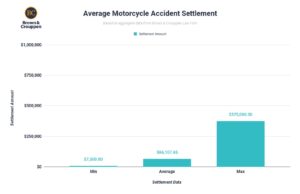
Use our guide to understand key legal considerations and what to do after a motorcycle accident.
1. Motorcycle Helmet Law
Missouri’s motorcycle helmet law requires all riders and passengers under the age of 26 to wear a helmet while operating or riding on a motorcycle. However, individuals 26 and older who carry proof of medical insurance are exempt from this requirement. See Revised Statutes of Missouri (RSMo) §302.020.
This change, implemented in 2020, reflects a shift from the state’s previous universal helmet law, which mandated helmet use for all riders regardless of age. While the updated law allows for more freedom of choice, it also places greater responsibility on riders, as those who opt out of wearing a helmet increase their risk of serious head injuries in an accident. For injury victims, helmet use—or the lack thereof—can play a role in determining the extent of compensation in personal injury claims. Understanding how the helmet law impacts your legal case is critical, particularly when dealing with insurance companies or opposing parties that may attempt to reduce payouts based on the presence or absence of helmet use.
2. Motorcycle Passenger Rights
Missouri’s motorcycle helmet law requires all riders and passengers under the age of 26 to wear a helmet while operating or riding on a motorcycle. However, individuals 26 and older who carry proof of medical insurance are exempt from this requirement. See Revised Statutes of Missouri (RSMo) §302.020.
This change, implemented in 2020, reflects a shift from the state’s previous universal helmet law, which mandated helmet use for all riders regardless of age. While the updated law allows for more freedom of choice, it also places greater responsibility on riders, as those who opt out of wearing a helmet increase their risk of serious head injuries in an accident. For injury victims, helmet use—or the lack thereof—can play a role in determining the extent of compensation in personal injury claims. Understanding how the helmet law impacts your legal case is critical, particularly when dealing with insurance companies or opposing parties that may attempt to reduce payouts based on the presence or absence of helmet use.
3. Motorcycle Traffic & Safety Laws
In Missouri, motorcyclists are required to follow the same traffic laws that apply to all motorists, with a few additional regulations specific to motorcycles. Key traffic laws that apply to motorcyclists in Missouri include:
1. Obeying Traffic Signals and Signs: Like all drivers, motorcyclists must follow all traffic control devices, including stop signs, traffic lights, and speed limits.
2. Lane Use and Lane Splitting: Motorcyclists are entitled to use the full lane for travel, meaning other vehicles are not allowed to share the same lane with a motorcycle. However, Missouri law prohibits “lane splitting”—the practice of riding between lanes of traffic or between rows of vehicles.
3. Headlights and Taillights: Under R.S.Mo. §307.365, motorcyclists must have both headlights and taillights in operation at all times while on the road, even during daylight hours. This helps increase visibility to other drivers.
4. Helmet Requirements: Missouri law, under R.S.Mo. §302.020, mandates helmet use for riders and passengers under the age of 26, with exemptions for older riders who have proof of medical insurance.
5. Passenger Regulations: As per R.S.Mo. §300.345, motorcyclists may not carry passengers unless their motorcycle is equipped with a seat designed for two people, and the passenger cannot sit in front of the operator.
- Motorcycle Endorsement: Riders must have a valid motorcycle endorsement (Class M) on their driver’s license or a motorcycle license to legally operate a motorcycle in Missouri.
- No Stunt Riding: Wheelies, reckless riding, and other stunts are prohibited under Missouri traffic laws, as they pose a risk to both the rider and others on the road.
- Alcohol and Drug Laws: Motorcyclists are subject to the same DUI/DWI laws as other drivers. Riding under the influence of alcohol or drugs is illegal and can result in severe penalties, including fines, license suspension, and possible jail time.
These laws are in place to ensure the safety of motorcyclists and other drivers on Missouri roads. Adherence to them is crucial not only for legal reasons but also for reducing the risk of serious injury or accidents.
4. Motorcycle License Requirements
1. Age Requirements: You must be at least 16 years old to apply for a motorcycle license or endorsement.
- Riders between 15 and a half to 16 years old may obtain a temporary instruction permit (TIP) under specific conditions, including completing an approved motorcycle rider training course.
2. Motorcycle Instruction Permit (Optional): Before applying for a full motorcycle license, individuals may obtain an instruction permit to practice riding. To get this permit, applicants must:
- Be at least 15 and a half years old.
- Pass the Class F and Class M written knowledge tests.
- Obtain parental consent if under 18 years old.
- Hold a valid motorcycle rider training course completion certificate if under 16.
- Pay the applicable fee for the permit.
Permit holders are restricted to daylight hours, cannot carry passengers, and are prohibited from riding on interstate highways.
3. Knowledge and Skills Tests: Applicants must pass two tests to obtain a motorcycle license or endorsement:
- Written Knowledge Test: Covers motorcycle-specific traffic laws, road signs, and safe riding practices. Some applicants can bypass the written test if they have completed an approved motorcycle rider training course.
- Skills Test: Evaluates the rider’s ability to operate a motorcycle safely. This test requires applicants to demonstrate their control, balance, and maneuvering skills in a controlled environment. Completion of a rider training course can also substitute for the skills test.
4. Motorcycle Rider Training Course: Missouri encourages new riders to complete a Missouri Motorcycle Safety Program (MMSP) approved rider training course, which can help applicants bypass the skills test and lower insurance rates. The course teaches essential riding skills, traffic laws, and safety strategies.
5. License Fees: Fees vary depending on the type of license or endorsement. The motorcycle endorsement (Class M) can be added to a standard driver’s license, or riders can obtain a standalone Class M motorcycle license.
6. License Renewal: Motorcycle licenses and endorsements are typically valid for a period of 3 to 6 years, depending on the rider’s age, and must be renewed with the Missouri Department of Revenue.
These requirements ensure that motorcyclists have the knowledge and skills to ride safely and in compliance with Missouri’s traffic laws.
5. Additional Legal Considerations
In Missouri, the statute of limitations for a motorcyclist injured due to another driver’s negligence is five years from the date of the accident. This time limit is outlined in R.S.Mo. §516.120 of the Revised Statutes of Missouri (RSMo) and applies to personal injury claims, including those arising from motorcycle accidents. This means that an injured motorcyclist has five years from the date of the accident to file a lawsuit seeking compensation for injuries, medical expenses, lost wages, pain and suffering, and other damages caused by the negligent driver. If the injured party fails to file a lawsuit within this time frame, they may lose the right to pursue legal action, and the court could dismiss the case. It’s important for injury victims to be aware of this deadline and to act promptly to protect their rights.
In some cases, such as those involving government entities, shorter time limits may apply, making it crucial to consult an attorney as soon as possible to ensure compliance with all applicable deadlines.
Get Help With Your Case From Brown & Crouppen Law Firm
At Brown & Crouppen, we represent victims of motorcycle accidents throughout the Midwest. Our Kansas City and St. Louis motorcycle accident lawyers represent individuals who have suffered injuries as a result of an accident.
Getting started with your case is easy. Call 888-801-4736 or request a free case evaluation from our legal team. Motorcyclists who have been injured may be eligible to pursue compensation for damages including pain and suffering, medical bills, and property damage. Since 1979, we’ve helped our clients recover over $1b as a result of settlements and verdicts, including those that were a result of a motorcycle accident.









